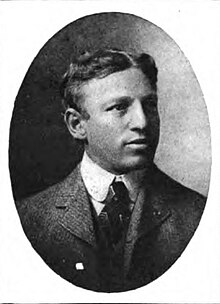Philip King (March 16, 1872 – January 7, 1938) was an American football player, coach, and lawyer. He played quarterback for the Princeton Tigers football team of Princeton University from 1890 to 1893, and was selected to the College Football All-America Team in 1891, 1892, and 1893. After his playing days, he served as the head football coach at the University of Wisconsin–Madison from 1896 to 1902 and again in 1905, and at Georgetown University in 1903, compiling a career college football record of 73–14–1. He was inducted into the College Football Hall of Fame as a player in 1962.
 | |
| Biographical details | |
|---|---|
| Born | March 16, 1872 Washington, D.C., U.S. |
| Died | January 7, 1938 (aged 65) Washington, D.C., U.S. |
| Playing career | |
| Football | |
| 1890–1893 | Princeton |
| Position(s) | Quarterback |
| Coaching career (HC unless noted) | |
| Football | |
| 1896–1902 | Wisconsin |
| 1903 | Georgetown |
| 1905 | Wisconsin |
| Baseball | |
| 1897 | Wisconsin |
| 1899 | Georgetown |
| 1900–1901 | Wisconsin |
| Head coaching record | |
| Overall | 73–14–1 (football) |
| Accomplishments and honors | |
| Championships | |
| 3 Western (1896, 1897, 1901) | |
| Awards | |
| 3× Consensus All-American (1891, 1892, 1893) | |
| College Football Hall of Fame Inducted in 1962 (profile) | |
Early life
editKing, who was Jewish, was born in Washington, D.C.[1][2]
Coaching career
editAt Wisconsin, King compiled a 66–11–1 (.853) record. The Badgers had four nine-win seasons during his tenure. King's 1896 and 1897 teams won the first two football championships of the Big Ten Conference, then known as the Western Conference. King's 1901 Wisconsin team went 9–0, outscored its opponents 317–5, and tied with Michigan for another conference title. His 66 wins was the most of any head coach in program history until Barry Alvarez passed him in 1999.
In 1903, King guided the Georgetown Blue and Gray to a 7–3 record.
Head coaching record
editFootball
edit| Year | Team | Overall | Conference | Standing | Bowl/playoffs | ||||
|---|---|---|---|---|---|---|---|---|---|
| Wisconsin Badgers (Western Conference) (1896–1902) | |||||||||
| 1896 | Wisconsin | 7–1–1 | 2–0–1 | 1st | |||||
| 1897 | Wisconsin | 9–1 | 3–0 | 1st | |||||
| 1898 | Wisconsin | 9–1 | 2–1 | 3rd | |||||
| 1899 | Wisconsin | 9–2 | 4–1 | 2nd | |||||
| 1900 | Wisconsin | 8–1 | 2–1 | 3rd | |||||
| 1901 | Wisconsin | 9–0 | 2–0 | T–1st | |||||
| 1902 | Wisconsin | 6–3 | 1–3 | 6th | |||||
| Georgetown Blue and Gray (Independent) (1903) | |||||||||
| 1903 | Georgetown | 7–3 | |||||||
| Georgetown: | 7–3 | ||||||||
| Wisconsin Badgers (Big Ten Conference) (1905) | |||||||||
| 1905 | Wisconsin | 8–2 | 1–2 | 5th | |||||
| Wisconsin: | 66–11–1 | 17–8–1 | |||||||
| Total: | 73–14–1 | ||||||||
| National championship Conference title Conference division title or championship game berth | |||||||||
See also
editReferences
edit- ^ Bernstein, M.F. (2009). Princeton Football. Arcadia Publishing. p. 23. ISBN 9780738565842. Retrieved December 3, 2014.
- ^ "Jews In American Sports; Phil King; Little Big Man". archive.is. Archived from the original on April 11, 2013. Retrieved December 3, 2014.
{{cite web}}: CS1 maint: bot: original URL status unknown (link)
External links
edit